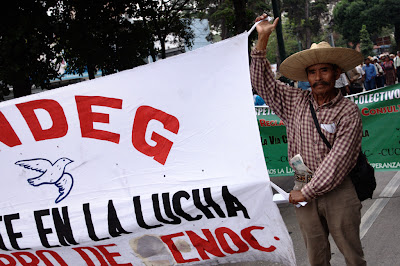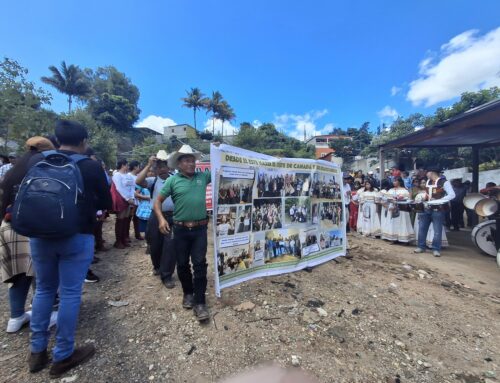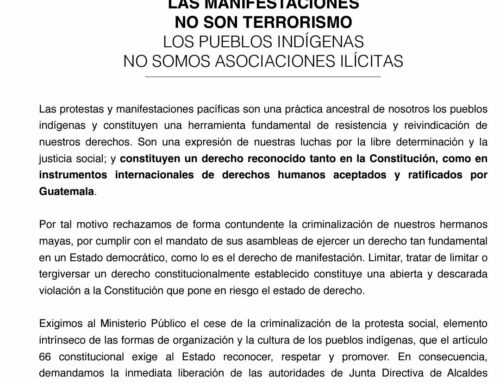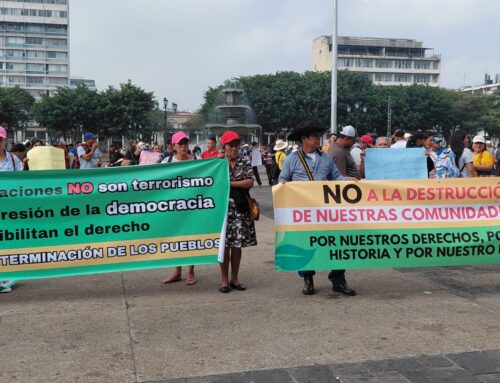 |
| Graham Hunt |
 |
| Graham Hunt |
On April 11, according to the
website of the Ministry of Work and Social Welfare (Ministerio de Trabajo y Previsión Social), “The Presidential Commission for the Redaction of the Regulation of Consultations of Indigenous Peoples of ILO Convention 169 extended until May 31 of the current year the period for receiving proposals and modifications regarding said regulation project.” The period was extended, according to the website, “. . . so that the Guatemalan population is able to comment and take part in this important convention.” Referring to the channels by which critiques regarding the proposed law might be submitted, the website states that “It should be indicated that all comments or suggestions can be submitted in writing to the High Dispatch of the Ministry of Work and Social Welfare.”
In an
injunction filed at the Constitutional Court on March 23, representatives of 25 municipalities that have carried out community referenda in different parts of the country demanded the suspension of the government’s attempt to regulate community consultations, alleging that the mechanism established to receive comments and suggestions on the proposed law was inadequate and, thus, that the the push for the law’s approval, itself, violated indigenous peoples’ right to free, prior, informed consent as defined in ILO 169. The Constitutional Court has not made any statements or issued any rulings on the issue.
 |
| Graham Hunt |
 |
| Graham Hunt |
 |
| Graham Hunt |
Outside the Canadian Embassy, representatives of the municipality of San Miguel Ixtahuacán, San Marcos, spoke of the effects of gold mining in their communities. Along with the neighboring municipality of Sipakapa, San Miguel Ixtahuacán is home to the Marlin I mine owned by Montana Exploradora, a subsidiary of the Canadian company Goldcorp. More than one year ago, on May 20, 2010, the Interamerican Human Rights Commission, part of the Organization of American States, granted precautionary measures in favor of San Miguel Ixtahuacán and Sipakapa, ordering that the Guatemalan government suspend the activities of the Marlin I mine until it can be independently proven that the mine’s operations pose no significant risk to the local population. To date, the mine’s operations continue.
 |
| Graham Hunt |
The march also passed by the U.S. Embassy and the headquarters of Cementos Progreso, a Guatemalan company with a controversial cement production facility in San Juan Sacatepéquez, to the west of Guatemala City.
 |
| Graham Hunt |
 |
A member of the Comité Campesino del Altiplano passes by a booth selling copies of legal texts including Guatemala’s Mining Law, near the Supreme Court in Guatemala City. The law requires transnational mining companies operating on Guatemalan soil to pay only 0.5% of their profits to the municipalities in which they operate and 0.5% to the national government in royalties. Graham Hunt
|
 |
| The protesters insisted once more that the Constitutional Court intervene to suspend the government’s attempt to regulate community referenda. Graham Hunt |
 |
| Graham Hunt |
 |
| In the Plaza de la Constitución, the protesters burned piñatas labeled with the names of former community leaders who have gone on to occupy government posts and who, according to the protesters, have betrayed the people they presume to represent by collaborating with transnational companies. Graham Hunt |
 |
| The demonstrators demanded access to the National Palace after having requested an audience with government officials at the Presidental Palace. Both requests were denied. Graham Hunt |
 |
| Graham Hunt |
.



















Leave A Comment